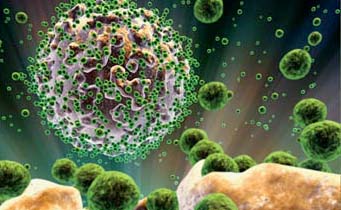When you get sick and need to take medicine, like an aspirin pill or cough syrup, the medicine spreads all over your body. A medicine’s job is to treat a specific problem but it doesn’t go directly to where the problem is in your body. So if it is aspirin it doesn’t go right to your head. Instead it spreads all over your body getting less and less useful as it gets spread out. Think about a drop of food coloring into a big bucket of water. The color slowly fades because it is getting diluted. Sometimes, a medicine can have side effects; aspirin can give you a stomach ache.
Side effects can also cause you to feel sleepy or nauseous and in some cases they can be much worse. Chemotherapy is a treatment that cancer patients sometimes take and the medicines used in chemotherapy are very strong and have strong side effects. People who are treated with chemotherapy sometimes loose their hair and it also makes it easier for them to get sick with other diseases because the chemotherapy makes it hard to fight off infections.
Through nanotechnology, scientists are starting to make smarter medicine to prevent these kinds of side effects and also to do even more in addition to treating problems. Scientists are attaching molecules to nano-sized particles such as quantum dots, carbon nanotubes, and buckyballs to make these smart medicines. The molecules on the particles allow them to find where the problem is more easily and they can also carry drugs that will only work where the problem is. In this way nano-medicine could prevent unwanted side effects.
Also, many nanoparticles like quantum dots and carbon nanotubes can do amazing things themselves – quantum dots give off light and carbon nanotubes can heat up. This really makes nano-medicines smart since a doctor could see where they are going inside of the body and make them heat up to kill cancer cells once they have found them.

